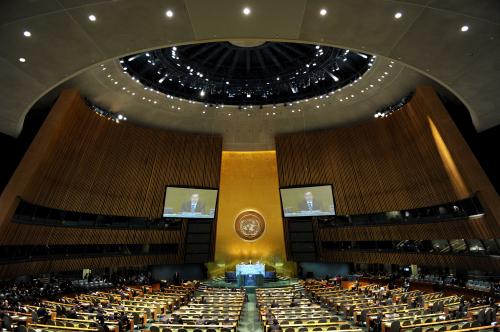|
 |
|
NUCLEAR CONCERNS: UN Secretary General Ban Ki-moon speaks at the High-Level Meeting on Nuclear Safety and Security at the UN headquarters in New York City on September 22 (SHEN HONG) |

This year marks the 40th anniversary of China's return to the UN. On October 25, 1971, the 26th Session of the UN General Assembly adopted Resolution 2758 and decided to restore the lawful seat of the People's Republic of China in the UN.
During the past four decades, China has been actively, deeply and fully involved in UN affairs. It has played a constructive role, and provided financial, material and personnel support to the UN. As a permanent member of the UN Security Council, it believes the UN's role today should be strengthened, not weakened.
China has always been committed to multilateralism. It holds the view that the UN, as the most inclusive, representative and authoritative intergovernmental organization, serves as an important stage for practicing multilateralism. It acknowledges the UN has been playing an irreplaceable role in protecting world peace, promoting common development and pushing forward international cooperation.
China took an active part in discussions at the 66th UN General Assembly this year. Speaking at the ministerial meeting on the famine in the Horn of Africa at the UN headquarters in New York City on September 24, Chinese Foreign Minister Yang Jiechi said the Chinese Government would provide emergency food aid and food assistance in cash worth 443.2 million yuan ($69.25 million) for famine-affected African countries, which is the largest sum of foreign food aid the Chinese Government has offered since the founding of the People's Republic in 1949.
This response exemplified China's commitment to the UN as well as its commitment to fulfilling its responsibilities as one of the world's major emerging economies.
UN member states attach great importance to the annual General Assembly because it provides a unique forum for multilateral discussions on international affairs. At the assembly, states can use the world's biggest multilateral stage to express their opinions and concerns on international affairs, and state their policies.
The 66th UN General Assembly opened on September 13 and will last until December. In addition to the general debate, a number of high-level conferences are held during the General Assembly. At these events, the world's leaders grapple with the challenging international situation.
The UN now has 193 member states and the world is expected to welcome its 7 billionth citizen in late October. As a crowded village with 7 billion residents, the Earth is going through huge environmental, economic, technological, geopolitical and demographic changes.
Shortages of resources and the global economic crisis are affecting enterprises, governments, families and communities across the world.
This year's UN General Assembly came in the midst of a turbulent and disturbing period. The current world situation is complicated. On the one hand, the world's nations have moved further along the path of peace, development and cooperation. A multilateral, economically globalized world is providing new opportunities for development.
On the other hand, the international financial crisis is still exerting pressure on the world's economy. Debt crises and inflation remain prominent problems. The international security situation has also become more complex. While West Asia and North Africa are beset with turbulence, non-traditional security problems such as climate change, energy security, food security and nuclear safety, pose severe threats.
In this context, the UN faces significant challenges in protecting world peace and security.
| 